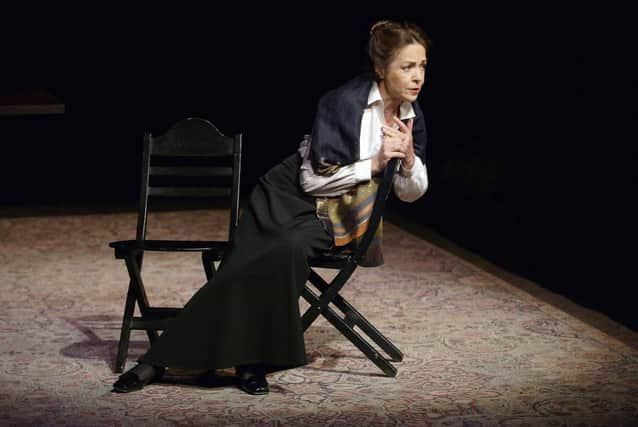Obituary: Natasha Parry, actress


HE was one of the outstanding actresses of the postwar years. Natasha Parry was recognised in various epic movies – notably Franco Zeffirelli’s 1968 Romeo and Juliet – but after her marriage to the renowned director Peter Brook she became a focal feature of his innovative work at the Bouffes du Nord centred at a theatre near the Gare du Nord in Paris. There she was seen in a variety of plays from Chekhov, Ionesco, Anouilh, Beckett to the major French and English classics. Critics hailed her performance in the demanding role of Winnie in Beckett’s Happy Days in Paris in 1995 as a landmark in French theatre.
She became known to British audiences when she did a season with the RSC in 1958 and also recorded for the BBC series, Jackanory – particularly memorable was The Magic Horse in 1967.
Advertisement
Hide AdAdvertisement
Hide AdIt was a Eugène Ionesco play that brought Parry to the Edinburgh Festival of 1963 with a star-studded cast. Exit the King was a surreal drama which was presented by the English Stage Company at the Royal Lyceum. Along with Parry the cast included Alec Guinness, Eileen Atkins, Googie Withers and was directed by George Devine. It was shown in Edinburgh prior to transferring to the Royal Court Theatre in London
The play dealt with the prospects of death and was deemed a rather unfestive offering by many. It was not that well received in Edinburgh by either the locals or the critics and it caused some controversy. Ronald Mavor in The Scotsman suggested, “Lightness was lost in the gloom”. It was a daunting evening and the decline of Guinness’s King was depicted “as a lunatic whose empire is a fantasy”. Amidst all this outré drama Parry presented an elegant and dignified presence. Mavor wrote “Parry suffers affectionately.”
In 1997 Parry brought to the Tramway Theatre in Glasgow Brook’s acclaimed production of Beckett’s Happy Days, Oh Les Beaux Jours, with Parry as Winnie. Given in the original French, Parry brought an air of musical charm to the proceedings. One critic wrote, “Natasha Parry’s Winnie is at turns a sophisticate, a coquette and, in the exquisite second act, a tragic heroine of Greek proportions.”
Parry was the daughter of a Russian mother and Anglo-Greek father. She performed in London as a child and, aged 15, was introduced to Brook at a Covent Garden ballet matinee. It was the beginning of a profoundly happy 70-year romance. After an on-off courtship they married in 1951.
Aged 19, Parry was in an Ealing Studio movie, Dance Hall (1950), which starred Diana Dors, Petula Clark and Kay Kendall. She continued to act and bring up their two children – Brook was much involved as a founder director of the Royal Shakespeare Company and she was busy making movies: as Lady Capulet in Romeo and Juliet, Windom’s Way (with Peter Finch in 1957), Oh! What a Lovely War (1969) and Brook’s Meetings With Remarkable Men (1979) in which she co-starred with Terence Stamp, Warren Mitchell and Tom Fleming.
Other films that brought Parry an international reputation included Knave of Hearts (1954) directed by René Clément with Gérard Philipe and Midnight Lace (1960). One of her most challenging roles was in Brook’s production of King Lear. The production was first seen on stage in Paris and then filmed for US television in 1953 with Orson Welles in the title role. Her Cordelia was touching, sensitive and made real by Parry’s evident and genuine love for the failing king played by Welles.
Parry was nominated for many cinema awards and received an Oscar nomination for her portrayal of Lady Capulet in the Zeffirelli film.
Her performances at the Bouffes du Nord were extraordinary. On a personal note I queued for hours to witness her historic portrayal of Madame Ranevskaya in a startling stripped-down version of The Cherry Orchard in 1981 with Michel Piccoli as her brother, Gayev. It was a performance full of grace, sadness and tranquillity. And so memorable.
Advertisement
Hide AdAdvertisement
Hide AdBrook set up his International Centre for Theatre Research in Paris in 1971 and was keen to research and produce different styles of theatre from all over the world – notably India and the Far East. Parry – who Brook relied on for what he himself called “her exquisite and fragile insistence on truth” – proved a constructive supporter of all his most inventive and imaginative productions and theatre experiments.
Parry was a doyenne of the Paris theatre scene and built up a strong following for her recitals of Shakespeare sonnets at the Bouffes du Nord. Only last year Parry, still radiant and debonair as ever, played the leading lady in a French film, The Taste of Blueberries, alongside Piccoli.
Natasha Parry is survived by Peter Brook and their son and daughter.